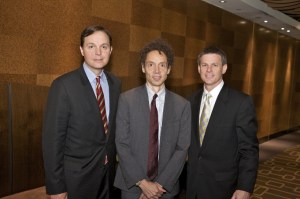Malcolm Gladwell, and What Fleetwood Mac Can Teach the Real Estate Industry
 On Thursday evening at Lincoln Center, Malcolm Gladwell strolled into the Allen Room, a 467-seat amphitheater with a spectacular view of Columbus Circle. Aside from the lime-colored backpack and signature curls, he dressed for the occasion in business conservative, complete with dark suit and maroon tie.
On Thursday evening at Lincoln Center, Malcolm Gladwell strolled into the Allen Room, a 467-seat amphitheater with a spectacular view of Columbus Circle. Aside from the lime-colored backpack and signature curls, he dressed for the occasion in business conservative, complete with dark suit and maroon tie.
Mr. Gladwell had the task of addressing a few hundred employees and clients of Colliers International, the massive commercial real estate brokerage with offices in 61 countries, which merged with the FirstService Real Estate group earlier this year.
Although the event was billed as the “tipping point” of commercial real estate, Mr. Gladwell drew mostly from his book Outliers, which focuses on qualities that make people successful. The speech was part pep talk, part theory, although Mr. Gladwell made it clear early on that square feet and asking rents were not going to be discussed.
“I’m not going to talk about real estate because I have a rule: I don’t talk about something my audience knows more about than me,” he said.
Instead, Mr. Gladwell talked about Fleetwood Mac.
“Everyone in this room has made out to a song by Fleetwood Mac,” he said. “The first idea I had was to lower the lights and bring in a bong, and we would all get high and listen to songs by Fleetwood Mac.”
Alas, such hedonism would violate Lincoln Center’s fire code, so instead Mr. Gladwell narrated the band’s arrival in America, which culminated in wild success with 1975’s self-titled album and 1977’s Rumours, which sprang from a chance meeting between Mick Fleetwood, Lindsey Buckingham and Stevie Nicks.
But Mr. Gladwell argued that the band’s success was a long process, one that involved a full 15 albums — including compilations, numerous lineup changes and former member Peter Green taking LSD and joining a German religious cult.
Through all the adversity, the band had four attributes that laid the foundation for success: the willingness to work hard for a long time (the standard for mastery is 10,000 hours, or about four hours a day, for 10 years); struggling through challenges (compensating for weakness rather than just building on strengths); a willingness to experiment and be creative; and having strong support (Atlantic Records, which stood by the band for a decade). In the process of expounding on these nuggets, Mr. Gladwell weaved a web of other examples, from classical musicians who practice long hours to less-regarded quarterbacks performing better than their highly-drafted peers.
No doubt these four principles were meant to stir the hearts of brokers and property managers, and Mr. Gladwell’s ability to reveal what seem to be universal truths through entertaining anecdotes is the cornerstone of his own success. He is bright, modest (part of his Canadian upbringing, no doubt) and a charming speaker, punctuating statements with a softly intoned “right?”
Critics inevitably claim that Mr. Gladwell oversimplifies complicated cases into easy, bite-sized brain morsels. But accessibility is an asset, and his dominance of the book charts is a testament to the power of his prose and the appeal of his ideas.
All in all, Mr. Gladwell provided a measure of star wattage to Colliers, and the crowd was appreciative. Although the premise of the pensive, lanky author cheering on what often seems to be the world’s least subtle industry still borders on the absurd, Mr. Gladwell was unafraid of embracing the unusual arrangement.
Undoubtedly it was part of the “willing to experiment” quality that he preaches.
rli@observer.com



